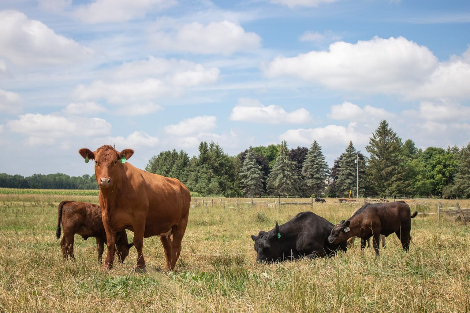Food from Thought’s livestock research will improve the competitiveness and sustainability of Canada’s livestock industry by using novel tools and data collected from University of Guelph research facilities to develop farm management practices, improved livestock productivity, efficiency, health and well-being, while reducing environmental impacts.
The use of technology in agriculture is generating enormous volumes of information that hold incredible promise to address a variety of challenges, from early detection of illness to individualized animal care to animal breeding. Food from Thought Researchers are creating a platform to store, organize and access data from all livestock research on campus, resulting in a centralized database that can be easily accessed for various analyses and will allow researchers to address higher-level comprehensive questions to inform animal management.

The swine industry is rapidly moving towards novel precision feeding approaches to optimize the balance between inputs and outputs. Food from Thought will focus on improving physiological assessments in swine by identifying reproductive markers and assessing behaviour- and bio-markers of stress, assessing protein quality and improving the efficiency of nutrient use by understanding how alkaline phosphatase functionality affects porcine gut health. These diverse projects will set the foundation for novel precision feeding approaches that will improve profitability and animal health.
Climate change and stressful environmental conditions can affect animal performance (such as growth, milk production, wool production and reproduction) as well as animal welfare and health. Food from Thought researchers will assess genetic and molecular traits to identify and breed dairy and beef cattle and sheep resilient to the stresses of climate change, enabling producers to better select and breed animals who can flourish under extreme weather conditions.
At the Ontario Beef Research Centre – Elora, vast amounts of data, including milk volume, feed intake, rumination, activity, and genetics are collected on each dairy cow. Food from Thought researchers will analyze the data from this precision management system to develop models that can target nutrient intake relative to individual animal needs, as well as to identify early warning signs of illness, and optimize reproductive success of dairy cattle. These findings will advance individualized management strategies and result in healthier, more productive cattle.
Significant improvements in genetic selection have resulted in larger, leaner, more efficient meat chickens produced weeks earlier, and commercial laying hens that achieve early sexual maturity, long-lasting peak egg production and extended egg-laying. However, these improvements may come at a cost to poultry health and welfare. Food from Thought research will collect and integrate data from several studies to assess the impact of different genotypes on the health of broiler chickens and develop precision management intervention strategies to improve the health and welfare of laying hens.